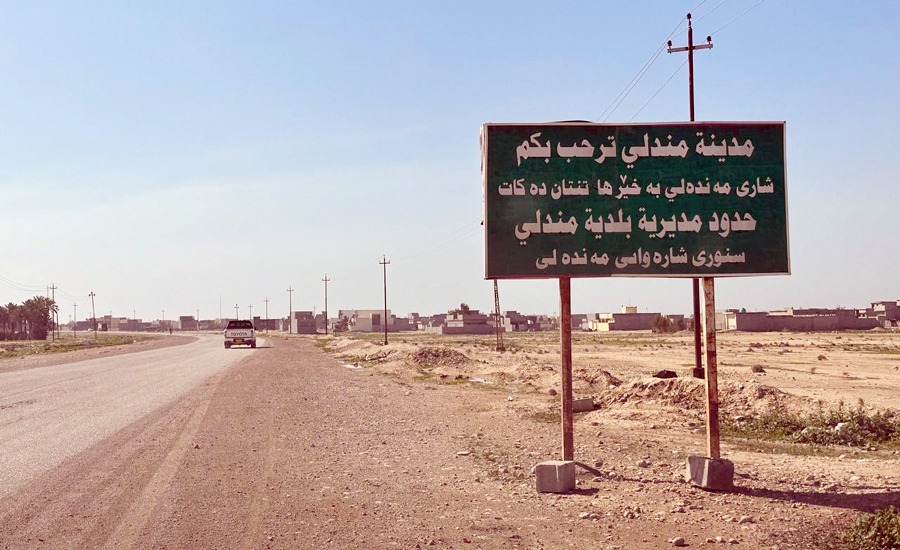Hussein Allawi had no choice but to wait for God's mercy. After all his relatives left Mandali, he had only one option left: to emigrate and leave the homeland of his fathers and grandfathers.
Allawi is one of the original Kurdish residents of Mandali. He spent his entire life there, but now he is counting the days before leaving for ever due to unemployment and lack of services.
"My neighbors and relatives from the Kurds left Mandali because life here has become difficult. We have no services, no water, no electricity, and no job opportunities.”
A father of six who suffers from unemployment like him, he added, "We all want to leave Mandali."
Mandali is one of the disputed areas in Diyala province, 93 kilometers away from Baqubah the center, and is inhabited by a mixture of Faylee Kurds, Arabs, and Turkmen.
Omar Adel, a resident of Mandali who owns a real estate brokerage office, pointed out that his daily dealings prove that the majority of Kurdish citizens have started selling their properties to members of other components.
“Out of 15 real estate buying and selling transactions, only 2 of them are bought by Kurds and the rest are bought by Arabs.”
He explained to KirkukNow that most of the Kurds who are still in Mandali have homes in other areas and return to Mandali from time to time. Omar revealed statistics from his real estate office that show that since the beginning of this year, out of a total of 1,000 real estate selling transactions, only 20 percent were bought by Kurds.
Kurds tend to sell their properties more
“Kurds tend to sell their properties more. They say that their lives have become difficult in light of the lack of services, so they rush to sell their properties.”
Overall, the streets and roads inside and outside Mandali are in poor condition. Residents suffer from water scarcity during the summer. The health system and education sector are similar to those in other areas of Diyala, but education there is only in Arabic.
Salar Hussein’s children were forced to enroll in schools in the Arabic Department because there were no schools in their mother tongue, while according to the constitution, Kurdish is an official language alongside Arabic and education must be in Kurdish in areas where Kurds constitute a majority.
“I wanted my children to study in Kurdish, but everything here is in Arabic,” Hussein told KirkukNow.
Hussein, a father of two, said that a Kurdish political party promised to open a Kurdish school in Mandali. The residents of Mandali provided a place to build the school, but the promises did not come to fruition, until the events of October 16, 2017.
Kurdish parties became active in Mandali after the fall of the Baath regime in 2003, and all senior positions were held by Kurds before they were transferred to the Iraqi federal government after its return in October 2017.
On October 16, 2017, the Iraqi Security Forces ISF, under orders from former Iraqi Prime Minister Haider al-Abadi, re-imposed control over the disputed territories, forcing the Peshmerga and other security forces affiliated with the Kurdistan Regional Government KRG to withdraw, after relations between Baghdad and Erbil deteriorated due to the independence referendum in the Kurdistan Region of Iraq KRI and the disputed territories.

Allawi says that the Kurdish parties and the Kurdistan Region have neglected the area, "despite Mandali being a historically Kurdish region... Thousands of Kurds are leaving Mandali every day... There are no Kurdish manifestations left in Mandali."
In March 2023, the Iraqi Ministry of Planning announced its approval to re-establish the Mandali district with the aim of restoring life to the districts that "suffer from neglect," according to the ministry.
Mandali was transformed into a district in 1947 and is one of the oldest districts in Iraq, but after 40 years, specifically in 1987, it was transformed again into a sub-district affiliated with Baladruz district in Diyala.
Mazen Akram, the mayor of Mandali, confirmed that the Kurds are moving from the district to other areas.
"The number of Kurds is constantly declining, especially in the Qarlus area, which is one of the largest areas of Mandali, whose residents were all Kurds before, but they left for Baladruz, Baghdad, and Baqubah," Mazen told KirkukNow.
Our language and traditional dress are on the verge of extinction
The sub-districts of Baladruz and Qazaniya were affiliated with Mandali district, before upgrading Baladruz into a district and Mandali into a sub-district affiliated with Baladruz. But after the creation of the Mandali district, Qazaniya became part of Mandali, whose population is estimated at 48,000 people, according to estimates by the Central Bureau of Statistics for the year 2019.
"Our language and traditional dress are on the verge of extinction," said Hussein, noting that the Kurds are looking for job opportunities and services, so they head to other areas of Diyala and the capital, Baghdad.
"We were optimistic after the fall of Saddam Hussein's regime in 2003 that Mandali would not face the problem of eviction again. We did not know that things would get worse."
The number of Fayli Kurds in Iraq is estimated at more than 800,000 people, most of whom live in the governorates of Diyala, Baghdad, and Wasit. During the rule of the Baath regime, the Faylis were subjected to displacement and the withdrawal of their citizenship because they were Kurds and belonged to the Shiite sect at the same time. In 2010, the Supreme Criminal Court considered the crimes committed against them to be crimes of genocide.
The mayor of Mandali says that the lack of services, partisan conflicts, and other problems, especially after the events of October 16, "have pushed many Kurds to emigrate from Mandali."
Mazen Akram added that Kurdish Education has not existed in Mandali for a long time, without providing any explanation or promises regarding improved services.





